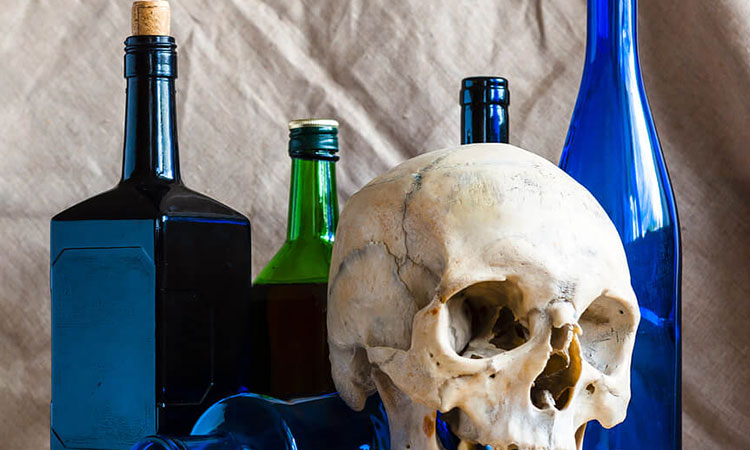
How Do You Know If You Have Alcohol Poisoning? – Many Americans consume alcohol every day or drink too much in general. And because few people understand the limitations of alcohol tolerance in the body, poisoning can occur rapidly and with little warning.
Alcohol Poisoning Symptoms
Symptoms of alcohol poisoning include the following:
- Confusion and disorientation
- Nausea and vomiting
- Hypothermia
- Stupor or unresponsiveness
- Cold, clammy skin
- Very poor coordination
- Irregular pulse/heart rate
- Depressed/labored breathing
- Choking
- Seizures
- Loss of bowel/bladder control
- Bluish-color skin (cyanosis)
Alcohol Poisoning Statistics
According to the Centers for Disease Control and Prevention (CDC) around 2,200 alcohol poisoning fatalities occur each year, which is about six each day. This might sound rare in comparison to, say, deaths related to opioids and some other substances, but the crazy thing about these fatalities is the amount of alcohol a person has to consume to reach this point.
In the U.S., one standard drink contains about 14 grams of pure alcohol, which is found in 12 ounces of beer (about 5% alcohol), 5 ounces of wine (about 12%), and 1.5 ounces of distilled spirits (about 40%). A lethal dose of alcohol for an adult is considered to be 5-8g per kilogram of weight.
Moreover, if a person who weighs about 60kg (132 pounds) consumes 300g of alcohol, this can prove fatal. When doing the math, this means that a person who has 300g of alcohol in their system has consumed at least 21 standard drinks. The standard drink is based on the liver’s ability to process alcohol in one hour—that is, the liver can process one beer, one glass of wine, or one 1.5 ounce shot of liquor.
Who Experiences Alcohol Poisoning?

Binge drinking is a major cause of alcohol poisoning in the U.S. “Binge drinking” is actually a technical term that is defined as the consumption of four or more drinks in a two-hour period for women, and five or more drinks in the same period for men.
Historically, binge drinking has been associated with college students, but in recent years the CDC has found that the group who suffers from alcohol poisoning most often is middle-aged adults. In fact, people aged 35-64 now experience alcohol poisoning more often than young adults.
This trend could be due, in part, to changes in body chemistry as people get older, prescription drugs that interact with or compound the effects of alcohol, and differences/changes in drinking preferences between the two demographics. Also, older adults may have more disposable income to buy alcohol. According to Smart Asset, the average 20-24 year old earns less than $30,000 per year, while the average person aged 35-44 earns more than $51,000 per year.
White, middle-aged men are the most likely to fall fatally ill from alcohol poisoning when compared to other groups. Surprisingly, 90% of binge drinkers who experience alcohol poisoning were not reported as being alcohol-dependent.
Effects of Alcohol Poisoning
Because the human liver can process only about one standard alcoholic drink per hour, if a person consumes two drinks or more, there will be one or more additional units in the person’s body which will take a longer time to process. When a person has consumed way too much alcohol, it builds up in the bloodstream and rapidly begins to affect regions of the brain that regulate vital bodily functions such as respiration and heart rate. Depressed, infrequent, or labored breathing, severely reduced body temperature, and seizures are all possible signs of alcohol poisoning.
Alcohol is almost always consumed as a liquid, so it is through digestion in the stomach and intestines that it enters the bloodstream and reaches the brain. Oral ingestion is one of the slower processes for administering an intoxicant, meaning that alcohol a person has consumed may not have fully reached the bloodstream when he or she starts to exhibit symptoms of extreme intoxication or alcohol poisoning.
Alcohol poisoning affects the body in the following ways:
- Impairing brain function, beginning with balance and coordination and eventually impacting other systems in the body
- Irritating the stomach and producing nausea and vomiting
- Hindering the gag reflex as muscles lose sensitivity and coordination, which can result in vomit aspiration
- Interfering with nerves that control breathing and heart rate, which can, in turn, cause these functions to decelerate, become irregular, or stop entirely
- Drastically reducing blood sugar, which can lead to seizures
- Decreasing body temperature, which can cause hypothermia
- Dehydration, which can cause brain damage
How to Help Someone With Alcohol Poisoning
If someone appears to be experiencing alcohol poisoning, call 911 immediately and remain in close proximity to the person to prevent accidental self-harm or choking. It is vitally important to seek emergency medical help as soon as possible, even if the person is conscious. There is likely to be even more alcohol in the person’s stomach yet to be processed that will further increase alcohol levels in the bloodstream.
There are several myths surrounding do-it-yourself treatment for alcohol poisoning that people erroneously believe may be helpful when in reality, may be harmful. Moreover, do not do any of the following:
DO NOT encourage the person to drink coffee. Caffeine is unlikely to help a person become more alert in this state and may lead to further dehydration.
DO NOT encourage the person to eat, as their gag reflex may be impaired and they may choke. For this same reason, do not try to make the person vomit to clear alcohol from the stomach.
DO NOT attempt to get the person to “walk it off,” because impaired physical coordination can lead to falls or other accidents.
DO NOT attempt to put the person in a cold shower, because this action may increase the risk of hypothermia.
DO NOT allow the person to just “sleep it off” because alcohol is probably still digesting into their bloodstream and symptoms could get much worse.
When emergency help arrives, the person will begin receiving medical treatment and be monitored until doctors are sure the alcohol has been eliminated from their system and no remaining damage is present that should be addressed.
How to Avoid Alcohol Poisoning

As noted above, it’s not exactly easy to die from alcohol poisoning in and of itself. However, even if the level of intoxication is not fatal, drinking to a point in which this is even a concern is extremely dangerous and can result in injury, car accidents, unsafe sex, and assaults, or any number of disastrous consequences.
There are several measures that everyone can take to prevent alcohol poisoning, including the following:
- Drink in moderation and limit yourself to one drink per hour.
- Drink water or other hydrating fluids after or with every drink, if possible.
- Do not drink on an empty stomach—food helps absorb alcohol, meaning that less alcohol will reach the bloodstream.
- Avoid drinking games or circumstances in which you may be encouraged to binge drink.
- Do not drink alcohol in combination with other substances, including both prescription medications and illegal drugs.
Get Help After Alcohol Poisoning
If a person is experiencing alcohol poisoning, it does not necessarily indicate that an alcohol use disorder is present. However, people who struggle with alcoholism do have an increased risk of alcohol poisoning. Anyone who drinks to this extent should be very concerned about the health risks involved and consider seeking treatment.
Rehab programs, such as those offered by Recovery By The Sea, can help those in need to recover from alcohol abuse. We use an integrated approach to the treatment of addiction that includes evidence-based services vital to recovery, such as psychotherapy, counseling, group support, and more.
We can help you reclaim the healthy and fulfilling life you deserve! Contact us today to find out how!